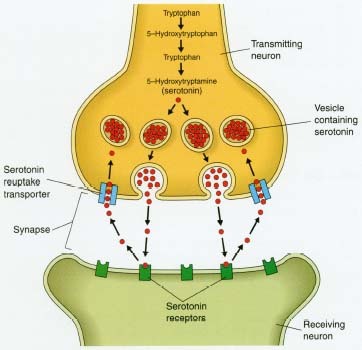Medications

Medications for mental emotional, behavioral, and mood disorders are prescribed by medical doctors called psychiatrists, often as part of a treatment plan that includes psychotherapy (talk therapy).
KEYWORDS
for searching the Internet and other reference sources
Neurotransmitters
Pharmacotherapy
Psychiatry
Psychopharmacology
Psychopharmacology
Psychopharmacology (SY-koe-far-ma-KOL-o-jee) is the study of how medications affect moods, thoughts, and feelings. Psychopharmacology is an exciting new science. When our grandparents were young, there were no medications that helped people with attention deficit hyperactivity disorder concentrate at school or work, no medications that helped people with schizophrenia quiet the voices in their heads, and no medications that helped people with depression find the energy to face a new day. Today there are prescription medications for these disorders and many others.
Psychiatric medications generally are classified into categories that reflect the chemistry of how they work in the body (mechanisms of action) or the symptoms they help relieve. Many medications fall into more than one category. For example, the same medication might improve symptoms of both depression and anxiety. These are some major types of psychiatric medications:
- antidepressant medications, which include tricyclic antidepressants (TCAs), monoamine oxidase inhibitors (MAOIs), and selective serotonin reuptake inhibitors (SSRIs)
- antianxiety medications (tranquilizers), which include barbiturates, benzodiazepines, and the atypical anxiolytic buspirone
- antimanic medications (mood stabilizers)
- anticonvulsant medications
- antipsychotic medications (neuroleptics)
- stimulants.
Examples of well-known psychiatric medications include Prozac and Paxil (antidepressants); Valium, Xanax, and BuSpar (antianxiety medications); lithium (antimanic medication); Tegretol and phenobarbital (anticonvulsants); Thorazine and Haldol (antipsychotics); and Ritalin and Concerta (stimulants).
How Do Psychiatric Medications Work?
Psychiatric medications target the complex chemistry of neurons and neurotransmitters in the brain and central nervous system. Neurotransmitters such as serotonin (ser-o-TONE-in) and dopamine (DOPE-a-meen) are manufactured in neurons (nerve cells) to carry messages from cell to cell, crossing the synaptic gap between the axon (transmitting terminal) of one neuron to the dendrites (receiving terminals) of the next neuron. The chemical structure of each neurotransmitter is designed to fit its neuroreceptor the way a key fits a lock. A change in a neurotransmitter's chemical structure, or an imbalance at any point in this complex process, may affect emotions, moods, thoughts, behaviors, and mental states. Psychiatric medications help restore proper balance. Important neurotransmitters include serotonin, dopamine, epinephrine, norepinephrine (monoamines), acetylcholine, gamma-aminobutyric acid (GABA), glutamic acid, enkephalins, and endorphins.
Physicians' Desk
Reference
(PDR)
Psychiatrists and psychopharmacologists study the research about medications before prescribing them. They attend training sessions, read medical journals, and review descriptions in the Physicians' Desk Reference (PDR) medical directory for details about how specific medications work (mechanisms), how they help patients (beneficial effects), whether they cause side effects (adverse effects), and whether they can be used safely with a patient's regular diet and other prescription medications (drug interactions).
The PDR lists medications by generic name (fluoxetine, for example) and also by the trade name given to a particular medication by the company that sells it (Prozac, in this case). Important psychiatric medications include:
Antidepressants
- amoxapine (Asendin)
- bupropion (Wellbutrin)
- clomipramine (Anafranil)
- doxepin (Sinequan or Adapin)
- maprotiline (Ludiomil)
- mirtazapine (Remeron)
- nefazodone (Serzone)
- trazodone (Desyrel)
- venlafaxine (Effexor)
Antidepressants/Tricyclics (TCAs)
- amitriptyline (Elavil)
- desipramine (Norpramin, Pertofrane)
- imipramine (Tofranil)
- nortriptyline (Pamelor, Aventyl)
Antidepressants/Monoamine Oxidase
Inhibitors (MAOIs)
- isocarboxazid (Marplan)
- phenelzine (Nardil)
- tranylcypromine (Parnate)
Antidepressants/Selective Serotonin
Reuptake Inhibitors (SSRIs)
- citalopram (Celexa)
- fluoxetine (Prozac)
- fluvoxamine (Luvox)
- paroxetine (Paxil)
- sertraline (Zoloft)
Antianxiety Medications (Anxiolytics,
Minor Tranquilizers)
- alprazolam (Xanax)
- buspirone (BuSpar)
- chlordiazepoxide (Librium, Librax, Libritabs)
- clorazepate (Tranxene, Azene)
- diazepam (Valium)
- halazepam (Paxipam)
- lorazepam (Ativan)
- oxazepam (Serax)
- prazepam (Centrax)
Antimanic Medications (Mood
Stabilizers)
- carbamazepine (Tegretol)
- divalproex sodium (Depakote)
- lithium carbonate (Eskalith, Lithane, Lithobid)
- lithium citrate (Cibalith-S)
Anticonvulsants
- carbamazepine (Tegretol)
- clonazepam (Klonopin)
- divalproex sodium (Deppakote)
- gabapentin (Neurontin)
- lamotrigine (Lamictil)
- oxcarbazepine (Trileptal)
- topiramate (Topamax)
- valproic acid (Depakene)
Antipsychotic Medications
- chlorpromazine (Thorazine)
- chlorprothixene (Taractan)
- clozapine (Clozaril)
- fluphenazine (Prolixin, Permitil)
- haloperidol (Haldol)
- loxapine (Loxitane, Daxolin)
- mesoridazine (Serentil)
- molindone (Moban, Lidone)
- olanzapine (Zyprexa)
- perphenazine (Trilafon)
- pimozide (Orap)
- quetiapine (Seroquel)
- risperidone (Risperdal)
- thioridazine (Mellaril)
- thiothixene (Navane)
- trifluoperazine (Stelazine)
- triflupromazine (Vesprin)
- ziprasidone (Geodone)
Stimulants
- dextroamphetamine (Adderall, Dexedrine)
- methylphenidate (Concerta, Ritalin)
- pemoline (Cylert)
- mixed amphetamine salts (Adderall)
What Are the Beneficial Effects
of Psychiatric Medications?
Psychiatric medications can help improve many of the most distressing symptoms of mental, emotional, and mood disorders. They can reduce the stress of living with chronic diseases and conditions, and they can improve the effectiveness of counseling and psychotherapy. Among their most beneficial effects are:
- decreasing feelings of hopelessness, darkness, and apathy in depression
- preventing relapse of depression
- reducing cravings, anxiety, obsessions, compulsions, and phobias
- preventing panic attacks
- reducing hallucinations, delusions, inappropriate behaviors, and the voices that often accompany schizophrenia
- calming impulsivity, hyperactivity, and mania
- improving concentration, memory, and sleep.

Selecting the right medication and the right dosage are complicated tasks, requiring that doctors take detailed medical histories from their patients and their patients' families. Doctors must know about other medical conditions the patient may have, about other medications the patient may be taking (including aspirin, alcohol, herbal supplements, and tobacco), and about the patient's diet and daily life. Doctors also must monitor patients who are taking medications to ensure that symptoms improve and to adjust dosages or change prescriptions if side effects occur.
What Are the Adverse Effects
of Psychiatric Medications?
Adverse effects are unwanted side effects, and psychiatric medications can have serious adverse effects if not monitored carefully by a doctor. Depending on the medication, adverse effects may include:
- drowsiness or sleepiness at the wrong time of day, making it dangerous to operate machinery or drive a car
- restlessness or wakefulness at night
- headache, dizziness, or blurry vision
- dry mouth or increased thirst
- high blood pressure
- skin rashes
- nausea or vomiting
- unwanted weight loss or unwanted weight gain
- unwanted changes in thoughts or behavior, such as losing interest in dating, losing interest in creativity, or having suicidal thoughts that never occurred before
- seizures, especially if a medication interacts with certain foods or other medications
- muscle spasms, slurred speech, or a movement disorder called tardive dyskinesia.
The complex chemistry of psychiatric medications and the central nervous system also can affect other body organs and systems, such as the blood, bone marrow, thyroid gland, liver, and kidneys. MAOIs can interact with cheeses, wines, or cold medications to cause seizures. Some medications can interfere with a child's normal growth and development. Others can pose serious risks to pregnant women, nursing mothers, and their babies. Older adults who are taking multiple prescriptions are at particular risk for harmful drug interactions. Some psychiatric medications also can lead to addiction, withdrawal symptoms if the medication is stopped, and accidental overdoses. People who use psychiatric medications must see their doctors regularly and report side effects as soon as they notice them.

What Is Next in Psychopharmacology?
The science of psychopharmacology is less than 50 years old, and discoveries are still being made at a rapid pace. Researchers are developing new medications that target more than one neurotransmitter at the same time, which means that they can improve symptoms in multiple categories at once. Also in development and clinical trials are newer medications with fewer adverse effects, reduced risk of addiction and withdrawal symptoms, and less chance for tardive dyskinesia.
Psychiatric medications are most effective when the people who take them work with psychiatrists and medical doctors to update their prescriptions as often as necessary.
Tardive Dyskinesia
Tardive dyskinesia (TAR-div DIS-kuh-NEE-zhuh) is one of the most distressing adverse effects of antipsychotic medication. It is a disorder of the neuromuscular system that causes muscle spasms and tics, which are involuntary movements affecting the eyes, tongue, face, neck, fingers, arms, toes, or legs. Tardive dyskinesia may disappear if the medication is stopped, but sometimes it becomes a chronic condition. People who develop tardive dyskinesia often continue taking their medication because the beneficial effects outweigh this very serious adverse effect.
Resources
Organizations
American Academy of Child and Adolescent Psychiatry, 3615 Wisconsin
Avenue Northwest, Washington, DC 20016-3007. This professional
organization for psychiatrists provides information about medications
for children and teenagers.
Telephone 202-966-7300
http://www.aacap.org
American Psychiatric Association, 1400 K Street Northwest, Washington,
DC 20005. The leading professional organization for psychiatrists in the
United States offers expert information about medications.
Telephone 888-357-7924
http://www.psych.org
U.S. Food and Drug Administration, 5600 Fishers Lane, Rockville, MD
20857-0001. This government agency provides the latest information on
new drugs and sound advice about the proper use of medications.
Telephone 888-463-6332
http://www.fda.gov
U.S. National Institute of Mental Health, 6001 Executive Boulevard, Room
8184, MSC 9663, Bethesda, MD 20892-9663. This government institute
publishes an informative booklet for families called Medications
(publication 95-3929), which also can be downloaded from its website in
PDF format. It also posts many other fact sheets at its website offering
safe and reliable information.
Telephone 301-443-4513
http://www.nimh.nih.gov
Comment about this article, ask questions, or add new information about this topic: